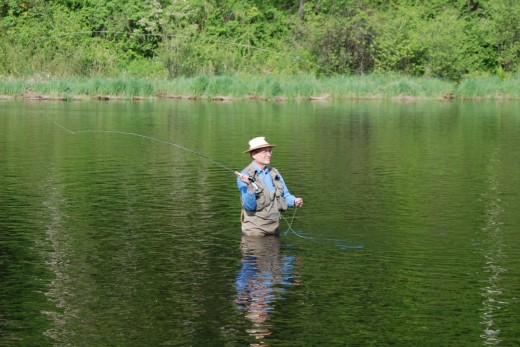Fly-fishing
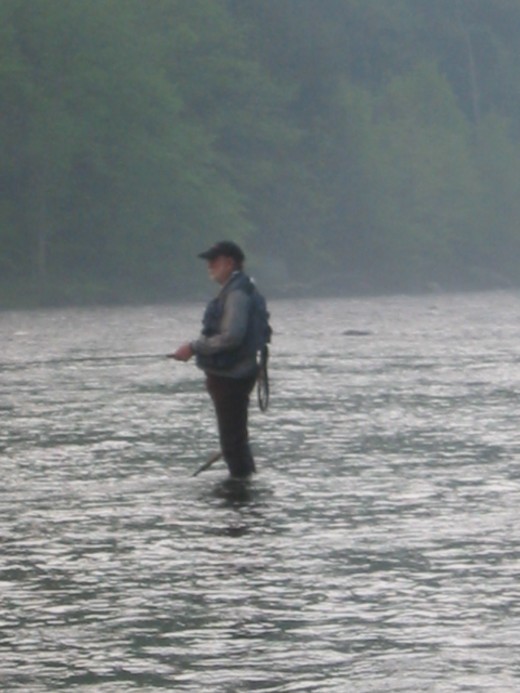
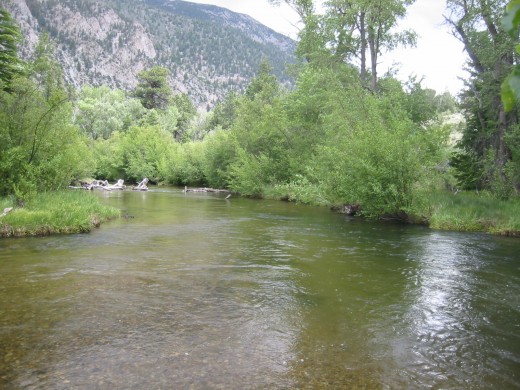
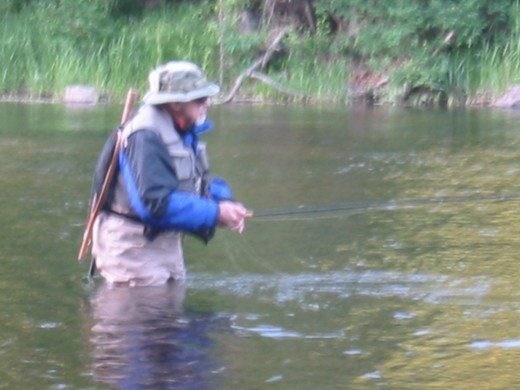
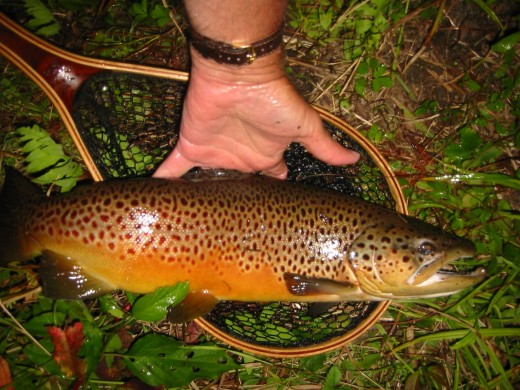
I have been fly-fishing now for several years, and because I am also an Ethics teacher by trade, I couldn’t help but put the two together and consider the ethics of fly-fishing. When considering an ethical question, it is often useful to drag out the intellectual tools that two great philosophers have provided for us. Immanuel Kant and John Stuart Mill have intimidating philosophical reputations, but their basic ethical theories are not all that difficult and are useful in sorting out reasoned ethical judgments.
Mill’s first insight was if one is considering an ethical choice then it is essential to project the consequences of the choice and to prudently weigh its costs and benefits (or utility as he would express it). His utilitarian theory is simple: we should make that choice which maximizes the benefits and minimizes the costs for everyone concerned. He usually construes “costs” as suffering and benefits as pleasure, and his analysis addresses the question of higher and lower pleasures. While not disdaining important pleasures and necessities like eating, he recognizes intellectual or spiritual pleasures as counting more in the scale. It is key to his theory that the choice must be optimal not just for the individual but for the general good of the community.
The great thing about Mill’s theory is that it has such a concrete starting point and rational plan for determining an ethical issue. Whenever I start to think his way, I feel like a kid with a set of legos or a new set of carpenter’s tools. To determine whether or not fly-fishing is ethical, all I have to do is count up the projected benefits and costs and put them in the balance. No doubt there are many pleasures and benefits to fly-fishing. When I first start considering this side of the question, the pleasures rush out of my memory like many angels seeking voice.
Fly-fishing has the great benefit of putting the fisherman in touch with nature. It is difficult to not take pleasure in this gorgeous world while standing in a trout stream at dusk, watching the changing light play on the water, the trees and the sky, and listening to the rush of water over rocks. For tired commuters, denizens of antiseptic towers, this benefit can hardly be overestimated. The blood pressure relaxes, and the painful thoughts of the day’s ignominies seem to wash down the river in a cold purifying flood. Occasionally, the experience of the beauty and goodness of it all borders on the spiritually ecstatic and gratitude flows through the heart. There is at least one, certain value worth experiencing and preserving: the beauty of this living planet. The reestablishment of this value as central to a humane culture is critically important as we face issues like global warming, pollution and war. Fly-fishing, one fly-fisherman at a time, helps in this process. Fly-fishermen are often on the frontlines of the struggle to restore and preserve our waterways and the related ecosystems. Organizations such as Trout Unlimited are busy about the business of removing dams, stocking trout, protecting endangered species and cleaning up pollution. Angler’s clubs all across the nation sponsor clean-up the river days and meet to discuss ways to steward the health of rivers and fisheries. These activities are clearly for the general good of rivers, people and even trout.
From a utilitarian perspective, it would seem that fly-fishing is all to the good; however, there are costs to be weighed in the balance: the suffering of the trout for example, the costs associated with the sport such as driving to the river, the pollution of used and discarded monofilament line, and the disturbance of nature along the banks caused by the many tromping feet of fishermen on their way to practice their sport. In the balance, I would judge that the benefits significantly outweigh the costs for the planet, for people and even for the general good of fish populations.
However, uneasiness remains. Perhaps Kant can shed some light on why. Kant’s ethical test for any plan of action is: “Is the proposed choice universalizable?” Would the ethical person recommend that the choice to fly-fish be the one all moral rational people should choose in the same circumstance? Furthermore, does the choice respect the dignity of all people concerned? Kant’s test cuts more deeply into the core of the morality of fly-fishing. After all, I could go down to the river just to sit, swim, take photographs or picnic and in so doing, become inspired to restore rivers. What makes fly-fishing the moral option among the alternatives that one might recommend? But perhaps all of these alternatives are moral options, that is, options that one might universally recommend. So, fly-fishing needn’t meet the test of being the best option, only that it be a moral one.
Kant didn’t worry much about animals and the treatment of animals. His ethical theory was meant to apply to moral-rational beings and animals just don’t meet that test. For example he couldn’t argue that one shouldn’t fish because it doesn’t respect the dignity of trout. Our dignity arises as the result of our ability to make moral-rational choices and trout don’t have this ability. It has been a recent development, at least in Western ethical theorizing, to include the suffering of animals within the circle of moral concern. And that is the nut of the issue for the fly-fisherman who is pondering the ethics of his passion. Although it is rare that a skilled fly-fisherman accidentally kills a trout (I would estimate it at perhaps one in a hundred or even fewer), it is undeniable that trout are not happy about being caught even if subsequently released. Some fly-fishermen who are not vegetarians (why is it difficult even to imagine a vegetarian fly-fisherman?) and yet bothered by the suffering trout issue, only catch and eat trout while avoiding catch and release fishing. This is an unusual decision for a fly-fisherman, based upon an ethical concern, but one that I find intelligible. This same concern might lead one ultimately to vegetarianism, but that is another issue not the subject of this essay.
One problem with Kant’s ethical analysis is that sometimes it cuts too deeply. The ethical test of universalizability would seem to balk at the least ethical qualm. Life is messy and there is hardly any human activity that doesn’t come at some ethical cost which may seem too high a price to pay for someone. A useful ethical theory must not demand perfection because, after all, we aren’t gods and practical theories need to be action guiding in the real world. In answer to the question “Can I recommend fly-fishing to everybody?” I would say yes but I can also understand the person who sympathizes with the trout, would rather not bother them and even judges fishing to be unethical.
I believe that the utilitarian would have little problem with affixing his or her stamp of approval to fly-fishing because of the record of fly-fishermen (and fly-fisherwomen, I might add. I see many women practicing the art these days) who become stewards of rivers as a consequence of the involvement in the activity.
It is interesting that many fly-fishermen are (forgive me) old or at least aging men. Fly-fishing has a meditative quality that appeals to people in the last third of their lives. It is sometimes called “the quiet sport”. It requires patience, a talent often in large supply as a person ages. But it is the reconnection, the retying, to nature that is the aspect of fly-fishing that is its most enduring value. As the fisherman gracefully casts his line to catch the trout, he is actually throwing a lifeline to his soul.
